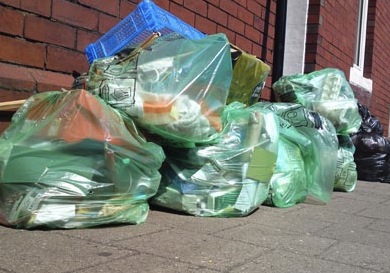It's time that we started talking rubbish
South Wales Evening Post - 25 February 2014
Whether it's through choice or necessity, we've all become a bit more aware of the environment over the years.
But for many people, including me, the means and motives involved in saving the planet sometimes feel a bit mixed up.
Around 58 per cent of people taking part in a Mori social attitudes survey agreed with the statement that "we are heading for an environmental disaster unless we change our habits quickly".
But it was the economy, immigration and unemployment that topped the list when the same people had earlier been asked to prioritise a list of 'the big issues' facing society today.
This apparent contradiction doesn't mean all the efforts to raise environmental awareness have gone to waste, so to speak.
It's just that human nature requires that the stick outweighs the carrot in terms of incentives.
And no more so than when it comes to the amount of stuff we throw away.
If you think this is a slightly cynical viewpoint then I present as my first exhibit the chap I spotted outside a local supermarket.
He showed no qualms about clearing the stuff left in his trolley by a previous customer and dumping it on to the floor instead of the nearby bin. Yet in his other hand he held a reusable carrier bag.
That recent memory resurfaced as I sifted through a sizeable pile of junk mail that landed on the doormat last week.
Ironically, among the offers of a new boiler and cut-price pizza was the warning that a new three black bag limit for refuse collections in Swansea will go into effect come April.

Wasted effort? More than enforcement is needed.
Like me, you're probably unimpressed by this proposed arrangement, especially when council tax is also going up.
But I also know that the economics of waste can be the stuff of nightmares.
Welsh government recycling targets, which affect all local authorities, are steadily rising.
The recovery target last year was at least 52 per cent. It is set to increase each year and reach 70 per cent by 2025.
There is a cash penalty per tonne for going over the limit.
This is in addition to a UK tariff for burying residual waste — what gets left over after recycling – known as Landfill Tax.
So the inconvenient truth, as someone once said, is that the driving force behind a local eagerness to minimise waste is mostly about the money.
That's all well and good, but I think local authorities could be doing things a bit smarter.
To my knowledge, talks have been going on in South West Wales for at least a decade about a regional plan for waste disposal. Everyone agrees that this will bring welcome economies of scale. The sticking points however are over the most effective disposal method and where the main facility should be sited.
There's a long-standing relationship between municipal muck & brass and we are losing out on the commercial benefits of large scale procurement deals. Continuing deadlock has already prompted a few councils to do their own thing contractually. Some are even looking to ship residual waste to mainland Europe for incineration.
As much as I favour local decision-making in most things, I really do think it's time for the Welsh Government to intervene in this instance. Otherwise we won't see any progress until way past the other side of local government reorganisation.
It has taken less than a generation for recycling to become a recognisable part of our lives. The habit of minimising waste makes sense, whatever the motivation.
What would be wrong though is for households and businesses to continue to shoulder the burden alone. Local authorities cannot rely entirely on the heavy hand of enforcement.
If they do, they risk undoing much of the progress that has been made.